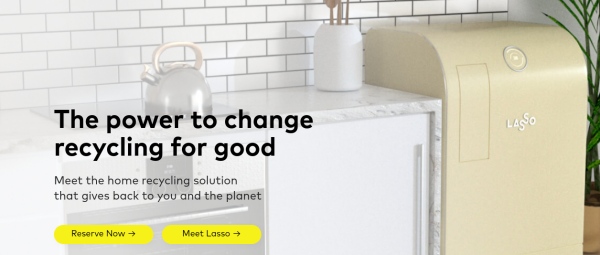The unsustainable dumbness of "smart" recycling
Because innovation, of course.
According to the Washington Post and to this summary there is a startup throwing money and human ingenuity to tackle “a flaw in our waste management systems that many people probably aren’t aware of."
Lasso Loop, the story says, is developing “a hefty home appliance machine that automatically sorts and breaks down the recyclables you toss inside it”.
How hefty, you ask? THIS hefty:

The current version of the machine is around 5k USD “bigger than a dishwasher but smaller than a fridge”. Eventually, it should cost significantly less (if incentives from local governments come…) and “squeeze under a countertop”.
Why?
The business case for the Lasso machine would be the fact that too much stuff that goes into domestic recycling bins is not recycled, or recyclable, because it is too dirty, or was not actually recyclable to begin with. This is real, well-known serious problem, and real solutions will never arrive early enough.
So what’s wrong with Lasso is not the problem the chose to solve. It is the whole direction towards they march to solve it, at least with a household product. The machine “uses a smattering of sensors, cameras and Artificial Intelligence (AI) to determine whether the stuff you’ve put inside it can be recycled."
That is how waste that is recyclable is “broken apart and stored separately in a series of bins based on type, to prevent contamination”. The rest is “summarily rejected”, and the bins would be emptied by Lasso subcontractors (as in “not by municipal companies, or with decent contracts”), summoned by a smartphone app.
Uber for garbage (that should not even exist). Of course
The “Uber for garbage” business model alone may be worth a few more posts. As just an example, think how valuable it would be for businesses to know exactly how much garbage a certain household produces, and of which types. Also, never mind that machines like that are only affordable by households with enough money to pay a kitchen big enough to host another appliance (alongside an equally smart fridge, of course!), and lots of individually wrapped products to throw inside it.
Those are other issues. The purpose of this post is to ask a few really basic questions to everybody considering purchase (or funding!) of machines whose declared purpose is to help people to just “toss (acceptable) plastics into them, and move on with their lives”:
- Is adding into every household even more polluting electronics that facilitate mindless consumption a smart solution to the problem of waste?
- Wouldn’t it be much more intelligent to, for example, demand laws that make it unprofitable to wrap food and non-food goods in non-100%-recyclable packaging? Or to make food travel back and forth across continents before it’s eaten??
- Which startups should receive the most funding and support, from both investors and governments?e Those developing sustainable packaging and products, or those who make money from the absence of such products?
Who writes this, why, and how to help
I am Marco Fioretti, tech writer and aspiring polymath doing human-digital research and popularization.
I do it because YOUR civil rights and the quality of YOUR life depend every year more on how software is used AROUND you.
To this end, I have already shared more than a million words on this blog, without any paywall or user tracking, and am sharing the next million through a newsletter, also without any paywall.
The more direct support I get, the more I can continue to inform for free parents, teachers, decision makers, and everybody else who should know more stuff like this. You can support me with paid subscriptions to my newsletter, donations via PayPal (mfioretti@nexaima.net) or LiberaPay, or in any of the other ways listed here.THANKS for your support!